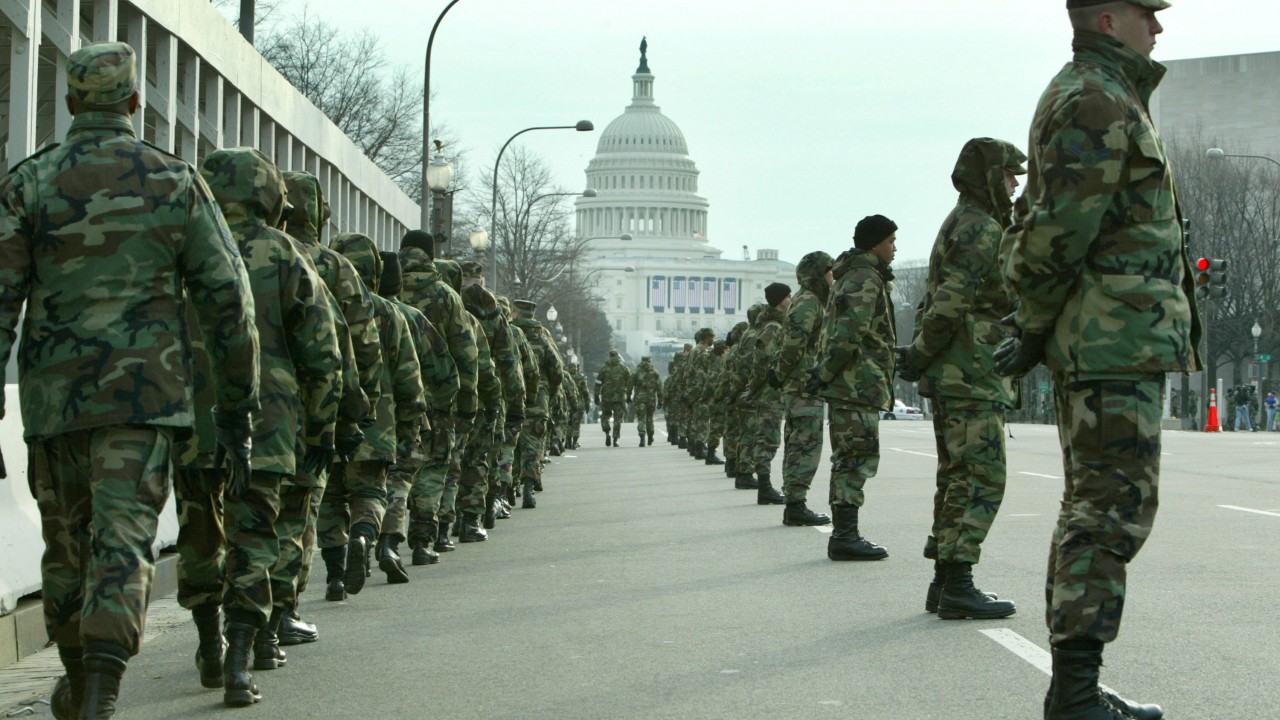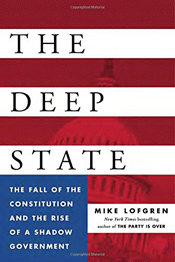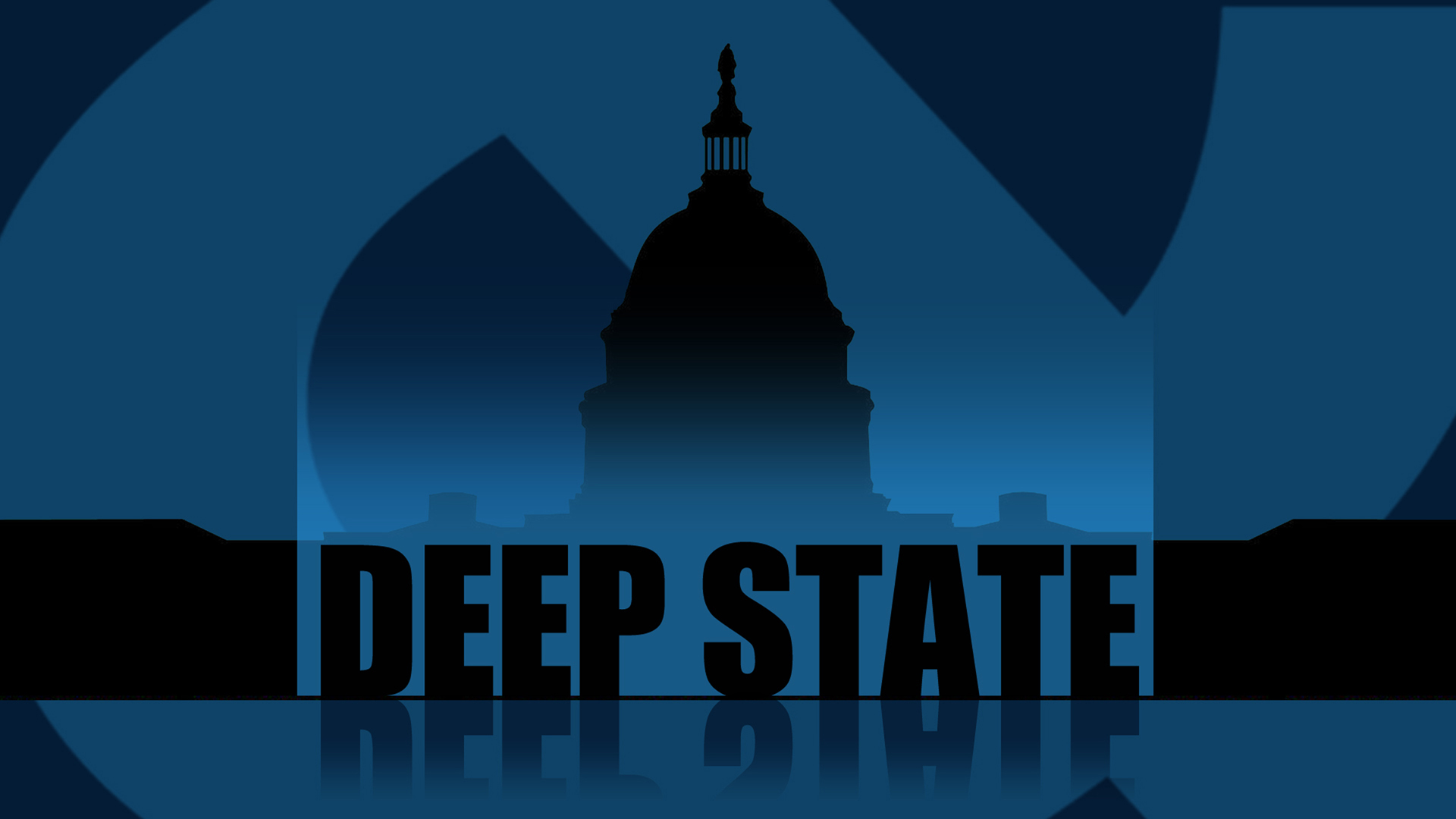
The national guard plans to assist election workers in Kentucky, Wisconsin, Nebraska, and Indiana. (Photo by Matthew Cavanaugh/Getty Images)
This post is an excerpt from The Deep State: The Fall of the Constitution and the Rise of a Shadow Government. Read our introduction to Mike Lofgren’s book and watch a video interview with him from Moyers & Company.
Camouflage Chic
As the seat of government and location of the headquarters of the armed forces, Washington has always had a large military contingent. Its presence is impossible to ignore. Now that it is regulation to wear camouflage uniforms as ordinary stateside service dress — is the rationale that an ISIS terrorist may emerge from behind the potted palm at the Washington Hilton? — this post-9/11 convention leads to some incongruous Washington scenes. It has always amused me to see an officer in camouflage dress and desert boots, briefcase in hand, queuing up to board the No. 101 Fairfax Connector bus en route to the Pentagon for grueling duty preparing PowerPoint slides for his general’s budget presentation. A desert camouflage uniform would not render the wearer particularly inconspicuous in an urban setting. Wouldn’t Brooks Brothers be the ultimate stealth clothing on K Street or Pennsylvania Avenue?
However that may be, it is an inescapable fact that Washington is unique among capital cities of the so-called free world in the ubiquity of its military presence. I have never seen anything comparable elsewhere except in East Berlin in 1974 and Moscow in 1979. The extent to which Washington has become a garrison town makes an ironic counterpoint to the widespread myth that the city is some kind of radical-liberal Gomorrah. Its genuine vices are of an altogether different kind.
Beginning in the 1990s, an increasing number of defense contractors, many of whom had been situated in Southern California, began to relocate their headquarters to Washington, D.C., and its suburbs so as to be closer to the political action. Lockheed, a defense and aerospace firm located on the West Coast, moved its headquarters to Bethesda, Maryland, in the D.C. suburbs, when it merged with Martin Marietta in 1995 to form Lockheed Martin. The merger, like those of many other military contractors at the time, should have been a scandal but wasn’t: two years before, at Secretary of Defense William Perry’s urging, Congress passed a provision allowing the merged companies to expense millions of dollars of merger costs on their contracts. (In other words, the taxpayer ended up footing the bill for what should have been in the companies’ business interest to do in the first place.) Companies like Northrop Grumman and General Dynamics have followed suit in this migration to Beltwayland. Even British contracting giant BAE Systems, Inc., has an imposing satellite office in suburban Virginia, just across the Memorial Bridge from the monuments of Washington.
It is worth examining BAE Systems, Inc., and asking just how a foreign company not only got prime real estate in Rosslyn, Virginia, within sight of the Pentagon, but rapidly grew to become the sixth-largest contractor in America’s military-industrial complex while being permitted to merge with domestic American companies specializing in extremely sensitive research and development work. London-based investigative journalist Andrew Feinstein told me that this de facto Deep State merger with a foreign entity grew out of the historical special relationship with the United Kingdom, and BAE’s capacity to engage in deals that were either politically or legally barred to its American counterparts.
During the 1980s, the Reagan administration wanted to make a military sale of unprecedented size to Saudi Arabia, but Congress balked. As a reward for Prime Minister Thatcher’s unrelenting diplomatic support of U.S. nuclear policy in Western Europe — which incited huge popular protests — the next-best thing was to let the British make the deal: BAE got most of the £45 billion Saudi deal. Six billion pounds of this sum consisted of “unauthorized commissions,” meaning bribes, to the Saudi royals. Since the British hardware had U.S. technology, the Justice Department was forced to take notice and impose a settlement on BAE. The latter had to pay some derisory fines, but the blooming relationship of America’s military-industrial complex with BAE was undeterred. BAE Systems, Inc., the American subsidiary of British parent BAE Systems plc, incorporated on American soil in 1999.
A decade and a half after the Saudi affair, the Deep State sought yet another helping hand from across the pond. At frequent points during the run-up to the invasion of Iraq, the tongue-tied George W. Bush sorely needed the mellifluous double-talk of British prime minister Tony Blair, on the theory that nothing sells hideously awful policy as well as an Oxford accent (the American political class swoons on cue at gibberish delivered with Received Pronunciation). By a strange coincidence, from the moment of Blair’s Iraq salesmanship onward, BAE Systems, Inc., grew rapidly.
Our stuffy British cousins are now really learning how to play the Washington game: in 2010 they chose Michael Chertoff to sit on the board of BAE Systems, Inc., and in 2012 they named him chairman of the board. While Chertoff displayed negligible administrative vision as Bush’s secretary of homeland security, he did distinguish himself by turning his department’s procurement system into a contractor-infested replica of the DOD’s in only a couple of years. His postgovernment career has been a single-minded attempt to cash in personally on his bureaucratic creation and his own notoriety. Also on the board are former congressman Lee H. Hamilton, the vice chairman of the 9/11 Commission, and General Anthony C. Zinni, former commander of the U.S. Central Command, the regional military authority in charge of Middle East conflicts.

Pentagon Metro, Arlington County, Virginia. (Credit: Sari Dennise, CC BY-NC 2010)
The Merchants of Death Go Madison Avenue
This seamless mixture of Mars and Mercury results in some picturesque Washington touches that could never have been glimpsed in Napoleonic Paris or Wilhelmine Berlin, however militarized those capitals may have been. A visitor to the city might be surprised to find ads in the city’s Metro system selling a fighter plane, or spot the huge sign on a telecom building near the Southeast-Southwest Freeway extolling the virtues of an aerial tanker aircraft. A reader of National Journal or Congressional Quarterly or Politico will discover full-page ads for the littoral combat ship.
A listener to WTOP news radio, the city’s highest-rated radio station, will hear commercial spots hawking some homeland security gizmo that promises to make our daily lives even more inconvenient, while other spots solicit persons possessing top-secret/SCI clearances (which give them access to the most sensitive “code word” information) to join this or that Beltway contractor for a unique and fulfilling career. All of this weapon-mongering has become so ubiquitous that no one stops to think and ask one elementary question: why on earth?
It is not as if the commuter from Reston or the soccer mom in Fairfax City is going to plunk down $135 million to buy a shiny new F-35. The U.S. government is a monopsony for the contractors: the sole customer for their wares. Even overseas contracts must be duly authorized, as Congress has the right to prohibit the sale. Government purchases must be made according to applicable statute and according to the Federal Acquisition Regulations, subject to the availability of funds appropriated expressly for the purpose. So why is public advertising necessary?
Despite the formal ban on using contract revenues for advertising, the fungibility of money makes it difficult to interpret ads by a company that is dependent on the government for most of its revenue as anything other than the use of taxpayer dollars in a propaganda campaign for the purpose of pushing their wares in front of Washington’s so-called opinion leaders. Whether they intended it or not, the contractors have succeeded in normalizing the abnormal by transforming the sale of a killer drone into the ethical equivalent of a Mad Men pitch for a new mouthwash brand.
All this shilling for implements of mayhem requires a corresponding quotient of hypocrisy. Every Memorial Day and Veterans Day, the major contractors take out full-page ads in the Post and many of the other political gazettes of the Beltway to salute and rhapsodize over America’s soldiers in the required reverential tone. There is a sort of unwritten rule that the bottomless cynicism of a merchant of death must not expose itself too visibly, lest the rubes in the provinces catch on. Precisely because I was annoyed by that hypocrisy, I had always enjoyed talking to Ted, an independent defense consultant and former congressional staff member, as he refused to pretend that he was engaged in some sort of patriotic and holy calling. In the immediate aftermath of 9/11, Ted let on to me that he was on the lookout for business opportunities with the bigger contractors that might open up as a result of that attack.
A couple of weeks later, I was meeting with Ann, a Washington representative of Lockheed Martin, in the Budget Committee conference room. This was several months before most of us had learned to treat invocations of 9/11 as a cynical ploy to advance overtly political agendas, and consequently most people were a bit uncomfortable discussing the topic. After completing her pitch on how the contracting community could be helpful to the Hill during those trying times, Ann launched into a soliloquy about how mortifyingly tasteless some people were in trying to cash in on a horrific tragedy. Her voice resonant with indignation, she emphasized that one consultant had had the gall to ask her company about business opportunities as a result of 9/11! It was Ted, of course, and it was evident that she was attempting to burn his contacts on the Hill. Her performance was all the more bitterly ironic in retrospect: in 2002, the first full year after the terrorist attacks, Lockheed Martin’s net sales increased by more than $2.5 billion. Like a Miss Manners of the military-industrial complex, the Lockheed Martin rep had undertaken to teach us the difference between proper and improper war profiteering.
The Flotsam of Foreign Intervention
Washington is in the business of running a global empire, and often enough its efforts misfire. The metropolitan area is therefore notable for its ethnic enclaves that have resulted from America’s failed interventions abroad over the last fifty years. At the conclusion of the Vietnam War, Arlington was flooded with so many Vietnamese refugees who had backed the wrong horse—us—that one neighborhood became known as “Little Saigon.” I once went with some Armed Services Committee colleagues to eat at a Vietnamese restaurant in Arlington that bore the telltale stigmata of America’s botched crusade in Southeast Asia: on the walls were at least two dozen black-and-white photos taken upcountry of American advisers in tiger-stripe cammies and boonie hats posing with local Vietnamese friendlies. After the 1979 Iranian revolution, another group of exiles, this time speaking Farsi, washed up on the Virginia shore of the Potomac. Now in the 2010s, one of the biggest concentrations of expats voting in the Iraqi elections is in northern Virginia, where polling places are provided.
Northern Virginia may be a magnet for these groups in part because of the close proximity to the Pentagon and CIA headquarters; both agencies have helped many former host country operatives and translators find a new life in America. Nguyễn Ngọc Loan, the South Vietnamese National Police chief whose shooting of a Vietcong suspect in front of a camera during the Tet offensive became a famous, or infamous, Pulitzer Prize–winning photograph, lived out his days running a pizzeria in Arlington. Khalifa Hifter, a Libyan army officer who defected to the CIA in the 1980s, spent many of the succeeding years living in Falls Church and Vienna, Virginia. In 2014, he had returned to Libya and was trying to overthrow the same people who, with U.S. assistance, had just finished overthrowing Muammar Gaddafi. Beneath its buttoned-down exterior, Washington, D.C., and its suburbs seethe with enough intrigue to rival World War II Casablanca, although it probably would not make as good a movie.
The War on Terror as a Washington Real Estate Scam
In the immediate aftermath of the September 11, 2001, terrorist attacks, I recall some informal discussion in Congress to the effect that Washington and its critical governmental nodes were too vulnerable to terrorist attacks. This was the time when there was a brief fad for “continuity of government” exercises, and Vice President Cheney, then a physical as well as political troglodyte, flitted between “secure, undisclosed locations” that were often underground. The proper institutional solution would have been to permanently disperse much of Washington’s governmental operations to areas around the country: with secure, encrypted teleconferencing and other electronic aids, this plan was eminently feasible. Most other cities have cheaper real estate and living costs.
The problem was the same one defense contractors had solved by moving their headquarters to Washington: career-anxious generals and bureaucrats like to be physically, and not just electronically, close to the action. The newly created Department of Homeland Security, which rapidly became the third-largest cabinet agency, would certainly seem to have been a prime candidate for relocation: if any agency should have been concerned about terrorist attacks, DHS was it. And as a brand-new agency, it could start with a clean slate in thinking about its headquarters location. Yet it ended up in Southeast D.C., less than three miles from the Capitol Building. The kicker was that the property DHS took over was the site of a disused, dungeon-like insane asylum, Saint Elizabeths Hospital. Those readers who are tired of having their shampoo bottles confiscated at airports might ponder the cosmic justice in the location of DHS’s headquarters, which is $1 billion over budget and 10 years behind schedule.
It reached an apotheosis of sorts in the DOD’s 2005 Base Realignment and Closure (BRAC) process. BRAC was supposed to reduce the excess military base infrastructure of the Department of Defense; yet Fort Belvoir, just 15 miles south of D.C., along with a related site not far away, ended up with 30,000 more personnel as a result. So much for dispersal: Beltwayland already has some of the worst traffic in the country, yet the geniuses on the Army staff decreed that it was appropriate to jam-pack commuters into facilities with no commuter rail transportation astride the main automobile evacuation route from D.C. to points south. The whole notion that 9/11 would “change everything” was, at least insofar as the convenience of the heads of agencies and commands was concerned, a fraud. The fact that the whole scam managed to lift local real estate prices has been a collateral benefit to Beltwayland’s numerous brokers and fixers.
That is not to say that nothing has changed. During the first few years after 9/11, Washington’s neoclassical core was defaced by checkpoints, miles of hideous Jersey wall and swarms of ninja-suited security squads. The city began to look less like Pierre l’Enfant’s architectural vision of the neoclassical capital of a virtuous republic and more like cold war East Berlin. But what fascinated me most was to watch the reaction of tourists. A large number actually seemed impressed by the display: It was just like television, and there they were in real life, caught up in some drama out of a Tom Clancy novel or an episode of 24. It was something they could relate to via their media conditioning. One suspects the vast majority of Americans’ acquiescence at airports and acceptance of surveillance can be traced to similar behavioral roots. If one is patted down or watched by the government, it is somehow reassuring to be worthy of all that trouble.
For all the bellyaching that goes on throughout the country about out-of-touch bureaucrats, corrupt and unresponsive government, and how much everyone hates Washington, these visible signs of our increasingly intrusive and overbearing government did not fall out of the sky upon an unsuspecting public. The Deep State, along with its headquarters in Washington, is not a negation of the American people’s character. It is an intensification of tendencies inherent in any aggregation of human beings. If the American people did not voluntarily give informed consent to the web of unaccountable influence that radiates from Washington and permeates the country, then their passive acquiescence, aided by false appeals to patriotism and occasional doses of fear, surely played a role. A majority of Americans have been anesthetized by the slow, incremental rise of the Deep State, a process that has taken decades.






